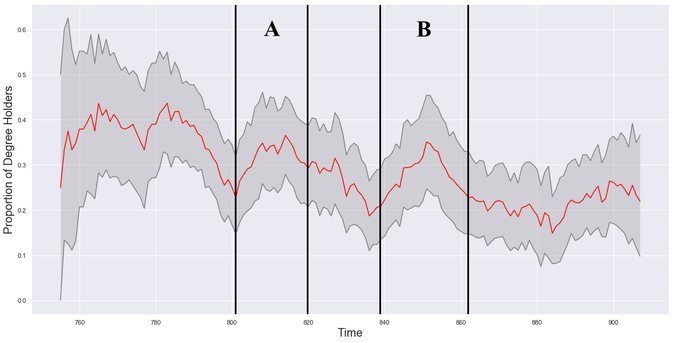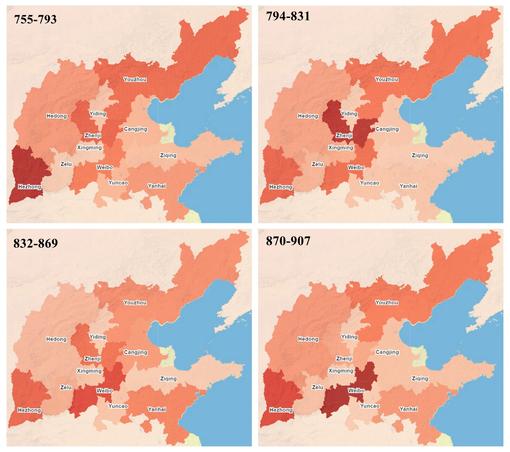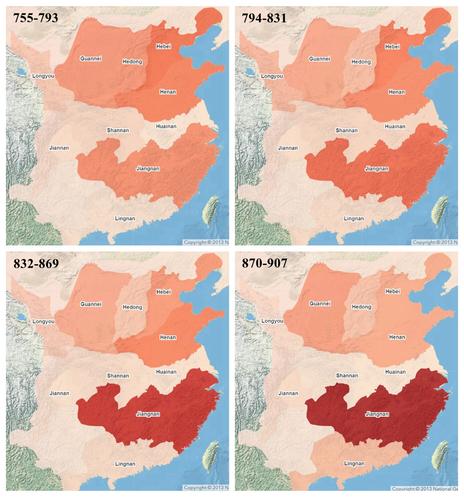@tedunderwoodillinois Therefore, it's enlightening for me to discover what happened to the top college students before the mass media explosion. And the idea of the "whole model of self-improvement was to read Wittgenstein & study Greek" sounds incredibly admirable. I sincerely hope to have spent my college life in a similar manner.
Assistant Professor at SISLT, University of Missouri. UIUC iSchool PhD. Peking University alumnus. Digital humanities researcher focusing on premodern Chinese history (and occasionally English literature).
wenyi-shang.github.io
@tedunderwoodillinois This story is new to me. In China, the dramatic increase in college enrollment rates and exposure to media happened simultaneously. In my parents' generation, being admitted to *any* college was a great achievement likely celebrated by the entire village (yes the urbanization also took place during the same period).
@TedUnderwood I believe Marx would like it if he were to read this quote😂
@quinnanya @TedUnderwood But you lost the fan Ted has got playing with it😂
@TedUnderwood I didn't know Dr Pepper is "prune" flavored. My Chinese friends are joking that it is "Ban-Lan-Gen" flavored: https://www.ncbi.nlm.nih.gov/pmc/articles/PMC4383212/.
Our special thanks to the editors @hildedeweerdt and @alizhorvathaliz and the anonymous reviewers! 7/7
We proposed this interpretation: the autonomous provincial governments offered office-holding opportunities to distract elites from non-prominent clans from the civil service examination, and the growing political independence of the region prompted elites from great clans to leave the region, accelerating the decline of the great clans with choronyms in the northeastern region. These contributed to the cultivation of a distinctive meritocratic culture in the region. 6/7
The "hometown" of a person mostly didn't refer to his actual birthplace, but "choronym", an indicator of his elite status as a member of a great clan originated there. Then why fewer degree holders had a northeastern hometown when the region was more politically independent? 5/7
The detailed temporal variation of the proportion of degree holders shows that fewer of them had a northeastern hometown when the region was more politically independent. Only one "changepoint" was detected, so that the downward tendency was the only significant tendency. 4/7
The center of examination success within the northeastern region shifted southwestward from the northeastern part of the region, where many great
clans originated from but became highly independent in the late Tang. This result corresponds to the decline of the great clans. 3/7
We assembled a list of "hometowns" (further explained below) of each degree holder in the civil service examinations, and tracked the geographical distribution of their hometowns. We found the center of examination success moved away from the autonomous northeastern region. 2/7
My article with
@TedUnderwood
for the special issue of #IJDH on digital humanities and East Asia studies is available at: https://rdcu.be/cXhLQ. The article in the journal website can be found at: https://link.springer.com/article/10.1007/s42803-022-00054-7.
We discussed the relationship between civil service examination records and political independence in Tang China (755–907 C.E.) 1/7
@TedUnderwood That is the thing came to my mind immediately after reading this as well. This will not really help them if they already identify someone (thus searching "Ted Underwood Twitter politics"), as they can easily have this done by human. But they can do some search like "accounts who feel uneasy about this new technology". Another step towards digital dystopia.


